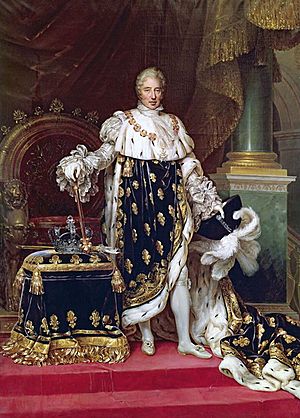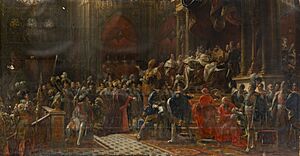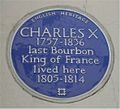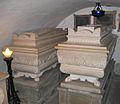Charles X of France facts for kids
Quick facts for kids Charles X |
|||||
|---|---|---|---|---|---|

Charles X, strong believer of Absolutism
|
|||||
| King of France and of Navarre | |||||
| Reign | 16 September 1824 – 2 August 1830 | ||||
| Predecessor | Louis XVIII | ||||
| Successor | Louis Philippe I | ||||
| Born | 9 October 1757 Palace of Versailles, France |
||||
| Died | 6 November 1836 (aged 79) Paris, France |
||||
| Burial | Kostanjevica Monastery, Nova Gorica, Slovenia | ||||
| Spouse | Marie Therese of Savoy | ||||
| Issue | Louis Antoine, Duke of Angoulême Charles Ferdinand, Duke of Berry |
||||
|
|||||
| Father | Louis, Dauphin of France | ||||
| Mother | Marie Josephe of Saxony | ||||
Charles X (1757-1836) was the King of France and Navarre from 1824 to 1830. He was the grandson of King Louis XV and the younger brother of kings Louis XVI and Louis XVIII. Before becoming king, he was known as Charles Philippe, Count of Artois. During the French Revolution, he was a leader of the émigrés, which were French people who left France because of the revolution.
Contents
Early Life
Charles-Philippe was born in 1757 at the Palace of Versailles. He was the youngest son of Louis Ferdinand, who was the Dauphin (or crown prince) of France. His mother was Marie Josèphe.
Charles was named the Count of Artois by his grandfather, King Louis XV. As the youngest boy in the royal family, it seemed very unlikely he would ever become king.
His father died in 1765. This made Charles's older brother, Louis Auguste (who later became King Louis XVI), the new Dauphin. Charles's mother, Marie Josèphe, died in 1767 from tuberculosis. Charles became an orphan when he was only nine years old.
During the 1770s, Charles spent a lot of money. He built up huge debts, which his brother Louis XVI paid off for him in the early 1780s.
Charles became more interested in politics around 1786. He led a group at the court of Louis XVI who wanted to keep the old ways. Charles supported removing special financial rules for the rich, but he did not want to change the social advantages that the Church and noble families had.
During and After the French Revolution
When the French Revolutionary Wars began in 1792, Charles left France and went to Great Britain. King George III welcomed him and gave him money. Charles lived in Edinburgh and London for a time.
After his brother, Louis XVIII, became King of France in 1814, Charles returned to France. There, he became a leader of the "ultraroyalist" party. This group strongly believed in the power of the king and wanted to bring back many old traditions.
King of France
When Charles became King of France, one of his first actions was to give a special title, "Royal Highness," to his cousins from the Orléans family. His brother, Louis XVIII, had not liked the Orléans family. Charles wanted to unite the different parts of the House of Bourbon royal family.
During his time as king, Charles showed great favor to the Roman Catholic Church and the noble families. This made many people angry and led to a revolution in July 1830.
July Revolution
Charles X strongly believed in Absolutism, which means a king should have complete power. He did not agree with the "Charter of the French Liberties," a set of rules that his brother, Louis XVIII, had put in place. This Charter limited the king's power and gave more rights to the people.
In July 1830, Charles took strong actions. He stopped the legislature (the law-making body), limited who could vote, and restricted the press (newspapers and media). People who believed in liberal ideas and other radical groups reacted strongly to the king's actions.
In Paris, angry citizens built barricades across the narrow streets. They fought with soldiers, throwing stones and roof tiles. The revolutionary tricolor flag was flown from the towers of Notre Dame cathedral.
Because of this uprising, Charles was forced to give up his throne. He went into exile in Britain again. His cousin, Louis-Philippe, became the new king. Louis-Philippe was the son of the Duke of Orleans, who had supported the French Revolution.
Death
Charles caught a disease called cholera when he arrived in Gorizia, Italy. He died on November 6, 1836. The people of the town showed their sadness by draping black cloths over their windows.
Charles was buried in the Church of the Annunciation of Our Lady. This church is part of the Franciscan Kostanjevica Monastery, which is now in Nova Gorica, Slovenia.
Marriage and Family
Charles X married Princess Maria Teresa of Savoy on November 16, 1773. She was the daughter of Victor Amadeus III of Sardinia. Charles and Maria Teresa had four children:
- Louis Antoine, Duke of Angoulême (born 1775 – died 1844)
- Sophie d'Artois (born 1776 – died 1783)
- Charles Ferdinand d'Artois, Duke of Berry (born 1778 – died 1820)
- Marie Thérèse d'Artois (born 1783)
Images for kids
-
A Blue plaque at 72 South Audley Street, Mayfair, London, his home between 1805 and 1814
-
Tombs of Charles X and his son Louis at the Kostanjevica Monastery in the Slovenian town of Nova Gorica
See also
 In Spanish: Carlos X de Francia para niños
In Spanish: Carlos X de Francia para niños
 | Emma Amos |
 | Edward Mitchell Bannister |
 | Larry D. Alexander |
 | Ernie Barnes |










